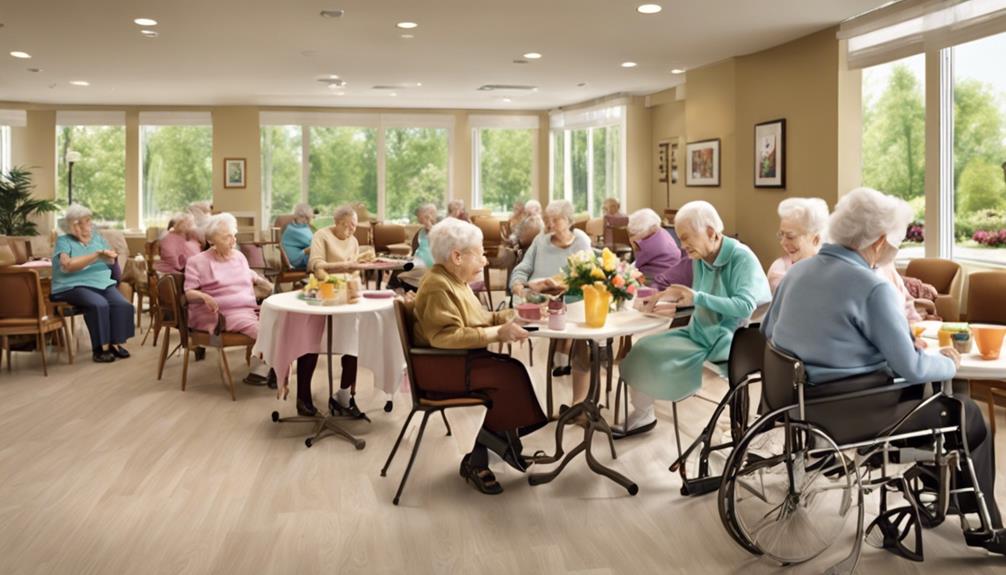Before deciding to relocate to an assisted living facility, it is essential to grasp the intricate connection between care, expenses, and standards. Delving into this intricate realm uncovers the need for a more thorough examination of certain elements.
From the intricacies of caregiving to the financial implications, our exploration will uncover essential insights that can profoundly impact decision-making processes.
By delving into these critical factors, we aim to provide a comprehensive understanding that goes beyond the surface, offering a deeper perspective on the intricacies of assisted living dynamics.
Key Takeaways
- Personalized care crucial for resident well-being
- Cost factors: care level, location, services
- Skilled staff and proper medication management vital
- Comprehensive approach enhances resident satisfaction
Key Aspects of Assisted Living Care
Ensuring proper medication management is a fundamental aspect of providing high-quality care in assisted living facilities to safeguard the well-being and safety of residents. In assisted living, personalized care tailored to each senior's unique needs is paramount. Regular assessments are conducted to maintain high care standards, ensuring any changes in health status are promptly addressed. Caregivers in assisted living facilities play a vital role in assisting residents with activities of daily living and offering crucial emotional support. By addressing the gaps in care and focusing on quality, residents receive the attention they deserve, leading to increased satisfaction and happiness.
Effective medication management isn't only about administering pills but understanding the individual's specific requirements and potential interactions. Hidden costs can arise from medication errors, making it essential to have a robust system in place to prevent such occurrences. By prioritizing medication management as part of senior care, assisted living facilities can enhance the quality of life for residents and provide a safe environment where their health needs are met with precision and compassion.
Understanding Cost Considerations

Understanding the various cost considerations associated with assisted living is crucial for individuals and families making decisions about senior care options. Assisted living costs can vary significantly depending on factors such as the level of care needed, the services and amenities provided, the type of accommodation chosen, and the location of the facility.
Urban areas generally have higher costs compared to rural settings due to the increased demand and cost of living. The level of care required by a resident directly impacts the overall expenses, with additional services like specialized medical care or personalized assistance adding to the total costs.
Residents should carefully consider their budget and the services they require to determine the most suitable option for their needs. By evaluating resident expenses, including accommodation type and additional services, individuals can gain a better understanding of the overall expenses associated with assisted living and make informed decisions about their senior care options.
Evaluating Service Quality Measures
To evaluate the service quality measures in assisted living, one must consider the regular assessments conducted to maintain high care standards. These assessments ensure that residents receive the best possible care and support their overall well-being.
Skilled staff play a crucial role in providing specialized care tailored to individual needs, fostering a sense of security and comfort for residents. Proper medication management is essential in maintaining the health and safety of residents, highlighting the importance of attention to detail and accuracy in care provision.
Additionally, the quality of care directly impacts residents' satisfaction and happiness, emphasizing the significance of consistent and compassionate care practices. By focusing on service quality measures such as skilled staff, specialized care, and medication management, assisted living facilities can create a nurturing environment that prioritizes residents' well-being and ensures their contentment.
Impact of Staffing and Training

Proper staffing levels and quality training of healthcare professionals are crucial factors that significantly impact the care standards in assisted living facilities. Adequate staffing levels ensure that residents' diverse care requirements are met effectively, promoting their well-being. When healthcare professionals receive thorough training, they're better equipped to deliver high-quality care, enhancing resident satisfaction levels. In contrast, insufficient staffing and training can result in communication gaps, compromising care coordination and overall quality.
Enhanced training programs play a vital role in bridging these gaps, fostering collaboration between staff members and external care providers. This improved communication not only boosts care quality but also contributes to resident safety measures. By investing in staffing and training, assisted living facilities can maintain high satisfaction levels among residents and their families.
Importance of Comprehensive Care Approach
Implementing a comprehensive care approach in assisted living facilities is paramount for ensuring residents' well-being and safety through personalized care plans. This approach involves tailoring care to meet each resident's specific needs, promoting a holistic and individualized approach to healthcare. Here are three key elements that highlight the importance of a comprehensive care approach:
- Specialized Staff: Having trained and specialized staff members allows for the provision of tailored support to residents with diverse and complex medical requirements. This expertise ensures that residents receive the necessary care and attention specific to their conditions.
- Medication Management: Proper medication management is essential in maintaining high care standards and promoting residents' overall health. Through careful monitoring and administration, assisted living facilities can enhance the well-being and safety of residents.
- Collaborative Efforts: Encouraging collaboration between staff members and healthcare providers fosters a cohesive care environment that prioritizes resident satisfaction and care quality. Regular assessments and clear communication further contribute to the effectiveness and continuity of care in assisted living settings.
Frequently Asked Questions
What Is the Meaning of Assisted Living Experience?
The assisted living experience is about receiving personalized care and support in a residential setting. It involves assistance with daily activities and access to medical services, striking a balance between independence and assistance.
Amenities like dining services, social activities, and transportation arrangements enhance the quality of life for residents. This environment fosters a sense of community and well-being, creating a safe and supportive space for seniors to thrive.
Conclusion
In the world of assisted living, care, cost, and quality are paramount. As the saying goes, 'It takes a village.' Together, we must prioritize collaboration, integrated care, and stringent regulations to ensure the well-being of our loved ones.
By focusing on comprehensive approaches, staffing, and training, we can truly make a difference in the lives of those in assisted living facilities. Let's work together to provide the best possible care for our seniors.









